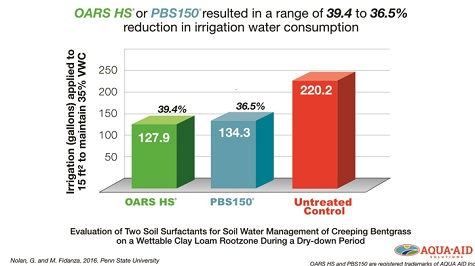
Together with their US partners, Aqua Aid Europe say they are the first company to have peer-reviewed research published, "affirming a proven water saving of over 35% using new patented technology in any type of growing media."
The company says the study verifies the initial research to quantify a reduction in irrigation water use and irrigation frequency with turfgrass treated with patented soil surfactant technology. This peer-reviewed Penn State University research study is published in the Journal of Environmental Horticulture - March 2024. The research was conducted on a clay loam rootzone to measure if irrigation inputs could be reduced on mineral soils that are common on all types of turf management systems.
Highlights of trial
A reduction in water consumption was noted as a side effect of improved moisture management in growing media. With the climatic changes and water being an increasingly precious source in the future, the company say they have focused on water saving first and improving turf grass playability second.
A spokesperson for AquaAid said, "We are proud to be the first company in the sports turf and horticulture industry to provide published, peer-reviewed research on patented surfactants, providing 35% or more water savings. PBS150® and OARS HS®, the two products utilised in the study, are patented proprietary surfactant technologies PBS150®, comprising a multi-branched surfactant technology, allows end users, which includes golf courses, sports turf, horticulture and homeowners, to use less product for season-long moisture management control versus other technologies on the market. The low use rates permit cost savings in labour, electric, as well as irrigation run times. With water becoming scarce around the world, this means a huge step forward in keeping the total water volume used as low as possible.

"Our customers worldwide are being asked to conserve water by eliminating acres of maintained surfaces and significantly reduce water usage within their agronomic programs. The factual proof in this study helps us to convince end users that their irrigation needs and total water volume used can be reduced drastically - a necessary step in the world we live in. The technology used is 100% biodegradable as it is eaten by soil microbes - promoting soil health, and fits in environmentally sustainable agronomics."